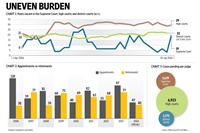National Judicial Appointments Commission (NJAC)
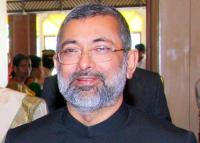 Justice Kurian Joseph’s historical counterfactual: If only the bench that heard the First Judges case in 1981 had not ignored Samsher Singh, there would not have been Second Judges, Third Judges, and Fourth Judges cases later.
Justice Kurian Joseph’s historical counterfactual: If only the bench that heard the First Judges case in 1981 had not ignored Samsher Singh, there would not have been Second Judges, Third Judges, and Fourth Judges cases later.
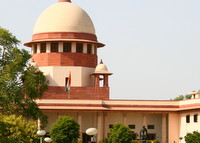 The future independence or otherwise of the judiciary will be decided today in the fourth judges case, ruling on the validity or otherwise of the National Judicial Appointments Commission (NJAC).
The future independence or otherwise of the judiciary will be decided today in the fourth judges case, ruling on the validity or otherwise of the National Judicial Appointments Commission (NJAC).
The Modi government’s law ministry wants the Supreme Court to disclose greater details about itself, including court-wise pendency of civil as well as criminal cases, number of adjournments in each particular case and sanctioned and working strength of judges to increase transparency in the legal system reported The Times of India.
The suggestions, given with an intent to increase transparency in the appraisal of Judges, were given to the e-court committee of the Supreme Court that operates the National Judicial Data Grid (NJDG).
The government is considering conducting an independent study using the data available through the NJDG to find out the cause of huge pendency in courts; at last count, the pendency in subordinate courts was estimated to be more than 2.65 crore while the total pendency was around 3.10 crore, including those in the SC and HCs.
The government’s demand comes before the Supreme Court is set to announce its verdict on the National Judicial Appointments Commission (NJAC) on which arguments were heard in detail in July this year. Transparency in appointment of judges has been one of the arguments used in favour of the NJAC
The PTI reported the law ministry releasing data that:
according to the latest data compiled by the Law Ministry, as on [1 August], the high courts were facing a shortage of 384 judges as against the approved strength of 1017. Thus, the 24 high courts are functioning with a working strength of 633 judges.
As on [1 May], there was a shortage of 366 judges in the high courts.
The Supreme Court is currently deliberating whether the National Judicial Appointments Commission (NJAC) is constitutional. In the meantime, new appointments to high courts have effectively been stalled.
"Justice [Gyan Sudha] Misra, who although sat a little after the scheduled time, never compromised by rising just after half-an-hour. She was the last one to leave the court premises, be it the Supreme Court or High Court. There were absolutely no cause-lists that were not exhausted by her and no judgments that were not churned out by her,” wrote her daughter, advocate Unnati Misra, in a letter to attorney general Mukul Rohatgi, as reported by the Indian Express’s Utkarsh Anand.
She was referring to Rohatgi’s repeated attacks on now retired Supreme Court judge Justice Misra’s habit of coming late to court as a notable example of a bad appointment made by the collegium, in his argument for the National Judicial Appointments Commission (NJAC) before the Supreme Court, saying he had “run down the reputation of people who have given their sweat and blood to judicial institutions, all in the name of NJAC, are reflective of bias and based on superficiality”.
However, Unnati Misra said that her mother had been recommended for the Supreme Court in 1986 before the collegium system and she was approved by six chief justices and Chief Justices of India (CJIs) before her elevation to the apex court in 1998 as the fourth woman to ever do so. She also wrote that her Justice Misra had fought “personal battles” caring for her ill husband, who passed away shortly after her retirement.
In 2013, Justice Misra had hit back at a Times of India column arguing that judges were “ultimately human beings” and not “robots”, and that judges “cannot be expected to give an account of every single minute or else face derogatory publicity”.
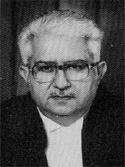 Madhan Mohan Punchhi, who passed away aged 81 last night, was Chief Justice of India (CJI) between 18 January 1998 and 9 October 1998.
Madhan Mohan Punchhi, who passed away aged 81 last night, was Chief Justice of India (CJI) between 18 January 1998 and 9 October 1998.
 The central government on Monday told the Supreme Court that any invalidation of the NJAC for the appointment of judges to the higher judiciary would not result in the automatic resurrection of the collegium system of appointment.
The central government on Monday told the Supreme Court that any invalidation of the NJAC for the appointment of judges to the higher judiciary would not result in the automatic resurrection of the collegium system of appointment.
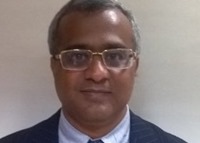 Advocate and patent lawyer Naren Thappeta, armed with rigorous data, argues that ‘Eminent People’ must consider metrics in judicial appointments.
Advocate and patent lawyer Naren Thappeta, armed with rigorous data, argues that ‘Eminent People’ must consider metrics in judicial appointments.
